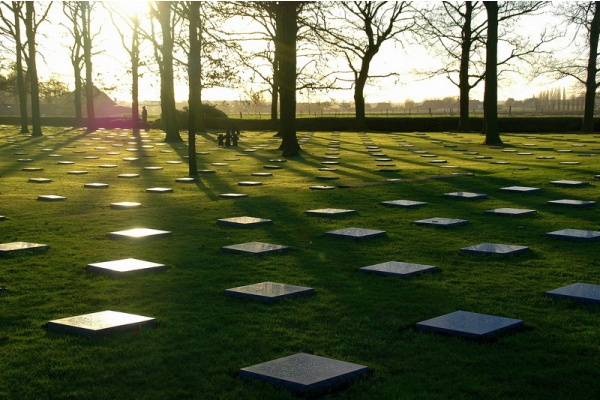With the centenary at hand, fallen soldiers have been a large topic of discussion, yet WWI Germans who lost their lives to the conflict seem to be largely out of the public mind by comparison. Belgian soldiers’ graves are visited frequently, with bugles played every day to keep their memories alive. Unfortunately, pride seems to be lacking in the Germans when it comes to their WWI dead. While pride in a war seems counterintuitive, it does seem as if a little more remembrance could be paid to those who died for their country.
The WWI cemetery on the Western Front that would be expected to yield the most foot traffic in terms of memorial visits is that of the Langemark cemetery, where nearly 50,000 lost German souls have been buried. This is partly due to the fact that Germany does not speak much of the war, preferring to leave their once nationalistic views in the past. While there is one mass grave with a large number of memorial plates honoring the names of the soldiers buried there, some gravesites do not even bear names at all.
Germans have put so much concentration on avoiding any displays of pride in their part during the war that the gravestones are not even made to stand upright, but instead must stay flat. Langemark is actually less than 70 years old, with the number of gravesites seeing at least a 400% decrease in between the end of WWI and the ‘50s. This takes on a much more significant scope when considering that there were over two millions deaths on their side of the war. This number was not matched by any other of the war’s participants.
Of course, this is not all due to the avoidance that the Germans are known for in regards to the war, but also to harsh limitations placed by Belgium. Belgium is responsible for some of the harsher rules such as the one dictating that crosses cannot be borne above the gravesites. It goes without saying that such regulations do not apply to the Belgian soldiers buried in the nearby WWI graves, the DW News reports.
The Germans who died in WWI have been largely lacking in respect due to denial by their own country and a bad taste in the mouth of Belgium. Regardless of feelings toward their part in the war, it seems difficult to deny that many casualties of war were young, patriotic men who were fresh out of training. It is a shame for any surviving relatives of such young men that, come Armistice Day, these Germans lost to WWI will also be lost to memory.
